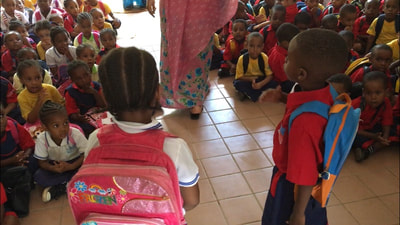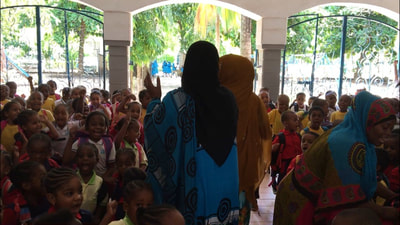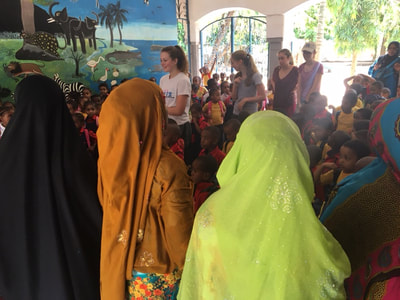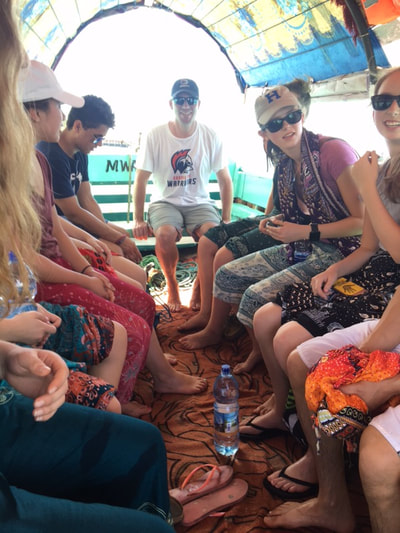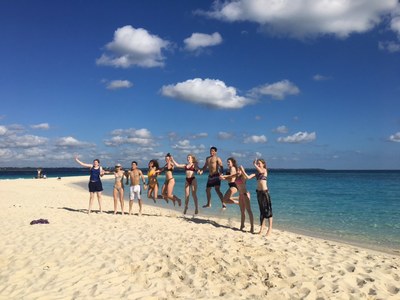Another hot and wonderful day here in Zanzibar! Today, we visited the SOS Children's Village School in the morning, before heading out to the sandbar for some beach time!
After waking up and the usual crossaints and hibiscus juice on the rooftop of our hotel, the group walked through the winding allies and streets to the Hailie Selassie School near Darjani Market. We waited there for a while for Fatma, admiring the white and blue pillars of the school. We then crammed into a small bus (which to me, looked more like a van) with about 15 seats. Fatma informed us that this is the cheapest, and most popular form of public transportation in the city, with a fare of 300 TSH, or roughly 14 cents, per person.
After the bus trip, we arrived at the SOS Children's Village school (or the Hermann Gmeiner Primary and Secondary School). There, we admired the expansive campus and sandy stone buildings, especially the central field containing a large mango tree (under which many of the school's students found shade). While waiting to meet with the headmaster, the group of high schoolers joined a PE class for 5-6 year old students. This was perhaps the highlight... We were able to play with about 30-40 young children. Milena was the most popular of the guests by far; the children gathered around her waiting for her to blow bubbles, then screaming and chasing them across the field to pop them when she did. One little girl even took off her hijab so she could swat at the bubbles with it!
When PE class ended, the group returned to find Mr Kahrl, Ms Knightly and Fatma nowhere in sight! Perplexed, we wandered around the school grounds recieving the occasional high-five before eventually we found them and rejoined the group. We then joined a kindergarten class for a meeting in an open air hall. There, perhaps 50-80 kids were assembled, sitting on the ground divided into rows of boys and girls, all dressed in school uniforms of red and yellow. As we entered, the children reached up to touch us and say hi (one little girl even grabbed my hand and kissed it when I said "rafiki", or friend, to her!). We then stood in a line at the front of the room as the teachers led the children through a series of songs in English. The entire group was especially impressed by the words to one song; the teachers, smiling widely, sung "you are special, everyone is special". The high school students were asked to teach the children our own song, so we belted out a few lines of "head, shoulders, knees and toes", "baa baa black sheep", and "itsy bitsy spider". The children, while unsure of the lyrics, seemed to enjoy the sing-along. Needless to say, we were very sad to leave them!
We went on to meet an official of the school, who explained to us what SOS Children's Villages does for the community. He told us that SOS has many locations around the world, and that the Zanzibar location opened in 1981. While their goal is to provide healthcare and education to disadvantaged (often orphaned or abandoned) children, a large part of the work they do centres around the "Family House" program. In this program, orphaned or abandoned children are selected by an admission committee to live in a family house and attend the school (which is one of the best in the country). As he explained, a family house is a house on campus where up to 10 children (under the age of 15) live under with one "mother", a woman who cares for and guides the children. After that, they transition to a Youth Hostel, where they can live until the age of 23.
He then took us to meet one of the "mothers". We met "Mama Fatma" in her house, sitting down in her living room to discuss her 25 years working as a mother with the school. She told us that she has 9 children, of varying ages, under her care, and that the older children often act as mentors for the younger students. When asked what her favorite part of the job, she replied that she loves helping needy children. The word "Mama", she says, means to her not only carer but teacher, organizer and motivator, and that is what she hopes to do with her children. She seemed to me a wise and passionate woman, who has dedicated her life to caring for and guiding children who might otherwise have been lost and alone. When touring the rooms of the children, I was struck both by a sense of sadness at how few possessions the children had (only a few feet of space to store their folded clothes in) and how lonely they must feel without family, and a sense of joy that they had been given such a rare and wonderful opportunity to get ahead in life. After all, Mama Fatma informed us that the first children she cared for 25 years ago are now working for Microsoft.
After the school, we took the bus back and had a brief lunch before heading out again to check out the sandbar, a sliver of sand about 100 meters long in the middle of the bay. The boat ride itself was choppy, with the small shaded wooden boat rocking back and forth on the waves. However, it was enjoyed by all (except for Wilson) and soon we arrived on the picturesque beach. There, the sand was a shining white, and the water a crystal clear turquoise in the shallow water surrounding it. We all quickly waded in, relishing the bathwater-like temperature of the ocean. There, we swum and splashed about for almost an hour, undeterred by the occasional mystery pinching sensation (and a small crab that hitched a ride on my swimsuit). We eventually left the sandbar exhausted but relaxed.
In the evening, we headed out to dinner at the "Spice Mistress", a Swahili restaurant tucked away in the backstreets. After climbing several long sets of stairs, we emerged on the roof of the restaurant, rewarded with a spectacular view above Stonetown. From our vantage point, we could even watch a dance competition going on in the old Portuguese fort, and were amazed by highly synchronized dance troops and backflips. After dinner, we decided to look in on the competition, and joined the crowd just in time for the awards ceremony. As the show was ending, we made our exit, and ended the night with ice cream in Forodani Garden.
After waking up and the usual crossaints and hibiscus juice on the rooftop of our hotel, the group walked through the winding allies and streets to the Hailie Selassie School near Darjani Market. We waited there for a while for Fatma, admiring the white and blue pillars of the school. We then crammed into a small bus (which to me, looked more like a van) with about 15 seats. Fatma informed us that this is the cheapest, and most popular form of public transportation in the city, with a fare of 300 TSH, or roughly 14 cents, per person.
After the bus trip, we arrived at the SOS Children's Village school (or the Hermann Gmeiner Primary and Secondary School). There, we admired the expansive campus and sandy stone buildings, especially the central field containing a large mango tree (under which many of the school's students found shade). While waiting to meet with the headmaster, the group of high schoolers joined a PE class for 5-6 year old students. This was perhaps the highlight... We were able to play with about 30-40 young children. Milena was the most popular of the guests by far; the children gathered around her waiting for her to blow bubbles, then screaming and chasing them across the field to pop them when she did. One little girl even took off her hijab so she could swat at the bubbles with it!
When PE class ended, the group returned to find Mr Kahrl, Ms Knightly and Fatma nowhere in sight! Perplexed, we wandered around the school grounds recieving the occasional high-five before eventually we found them and rejoined the group. We then joined a kindergarten class for a meeting in an open air hall. There, perhaps 50-80 kids were assembled, sitting on the ground divided into rows of boys and girls, all dressed in school uniforms of red and yellow. As we entered, the children reached up to touch us and say hi (one little girl even grabbed my hand and kissed it when I said "rafiki", or friend, to her!). We then stood in a line at the front of the room as the teachers led the children through a series of songs in English. The entire group was especially impressed by the words to one song; the teachers, smiling widely, sung "you are special, everyone is special". The high school students were asked to teach the children our own song, so we belted out a few lines of "head, shoulders, knees and toes", "baa baa black sheep", and "itsy bitsy spider". The children, while unsure of the lyrics, seemed to enjoy the sing-along. Needless to say, we were very sad to leave them!
We went on to meet an official of the school, who explained to us what SOS Children's Villages does for the community. He told us that SOS has many locations around the world, and that the Zanzibar location opened in 1981. While their goal is to provide healthcare and education to disadvantaged (often orphaned or abandoned) children, a large part of the work they do centres around the "Family House" program. In this program, orphaned or abandoned children are selected by an admission committee to live in a family house and attend the school (which is one of the best in the country). As he explained, a family house is a house on campus where up to 10 children (under the age of 15) live under with one "mother", a woman who cares for and guides the children. After that, they transition to a Youth Hostel, where they can live until the age of 23.
He then took us to meet one of the "mothers". We met "Mama Fatma" in her house, sitting down in her living room to discuss her 25 years working as a mother with the school. She told us that she has 9 children, of varying ages, under her care, and that the older children often act as mentors for the younger students. When asked what her favorite part of the job, she replied that she loves helping needy children. The word "Mama", she says, means to her not only carer but teacher, organizer and motivator, and that is what she hopes to do with her children. She seemed to me a wise and passionate woman, who has dedicated her life to caring for and guiding children who might otherwise have been lost and alone. When touring the rooms of the children, I was struck both by a sense of sadness at how few possessions the children had (only a few feet of space to store their folded clothes in) and how lonely they must feel without family, and a sense of joy that they had been given such a rare and wonderful opportunity to get ahead in life. After all, Mama Fatma informed us that the first children she cared for 25 years ago are now working for Microsoft.
After the school, we took the bus back and had a brief lunch before heading out again to check out the sandbar, a sliver of sand about 100 meters long in the middle of the bay. The boat ride itself was choppy, with the small shaded wooden boat rocking back and forth on the waves. However, it was enjoyed by all (except for Wilson) and soon we arrived on the picturesque beach. There, the sand was a shining white, and the water a crystal clear turquoise in the shallow water surrounding it. We all quickly waded in, relishing the bathwater-like temperature of the ocean. There, we swum and splashed about for almost an hour, undeterred by the occasional mystery pinching sensation (and a small crab that hitched a ride on my swimsuit). We eventually left the sandbar exhausted but relaxed.
In the evening, we headed out to dinner at the "Spice Mistress", a Swahili restaurant tucked away in the backstreets. After climbing several long sets of stairs, we emerged on the roof of the restaurant, rewarded with a spectacular view above Stonetown. From our vantage point, we could even watch a dance competition going on in the old Portuguese fort, and were amazed by highly synchronized dance troops and backflips. After dinner, we decided to look in on the competition, and joined the crowd just in time for the awards ceremony. As the show was ending, we made our exit, and ended the night with ice cream in Forodani Garden.

